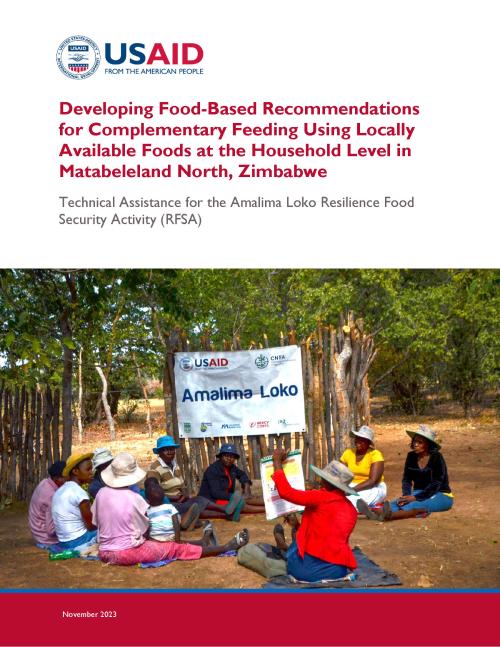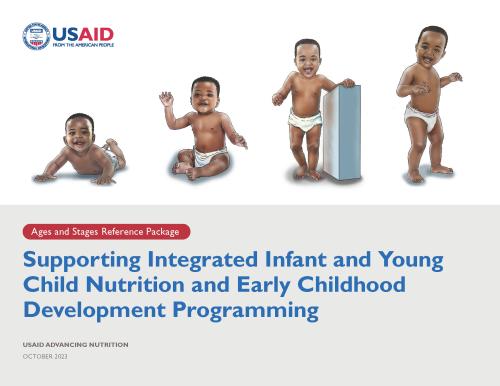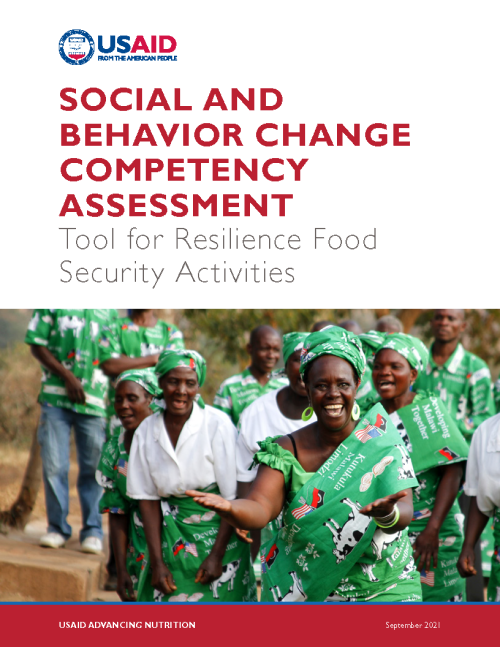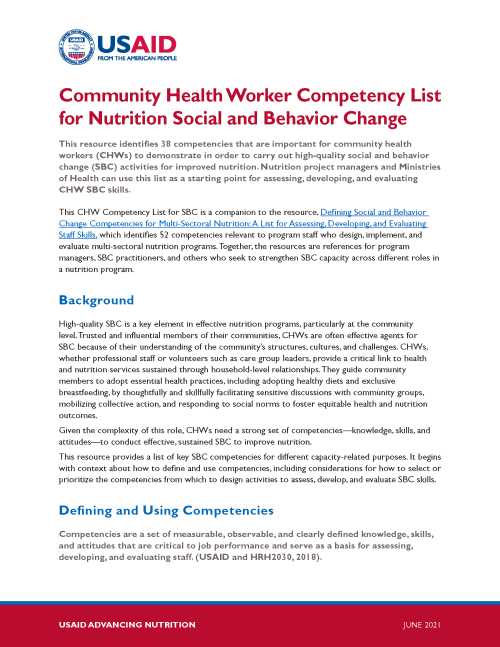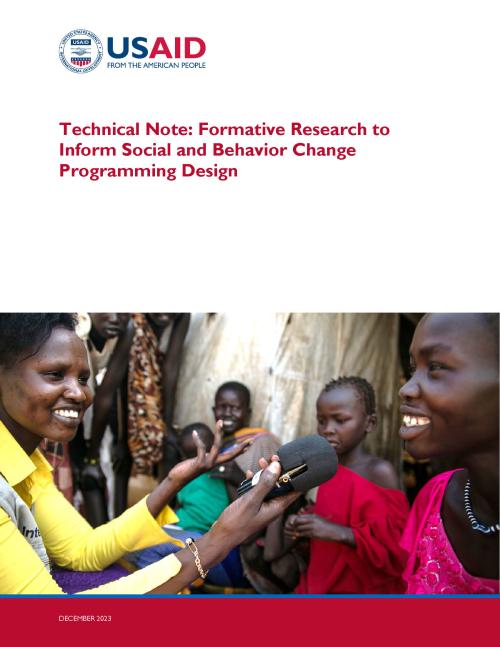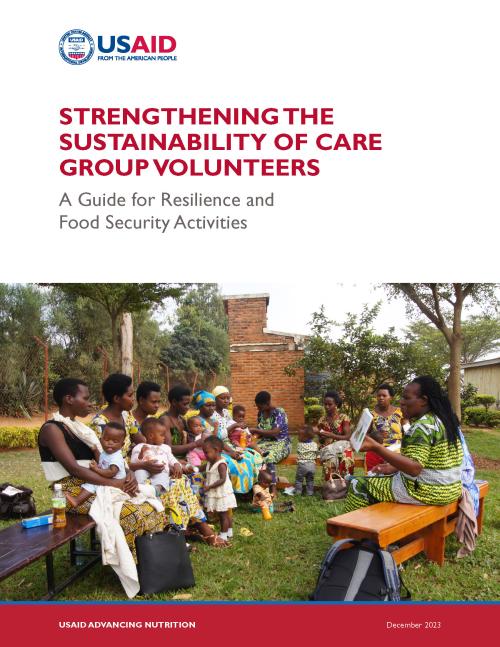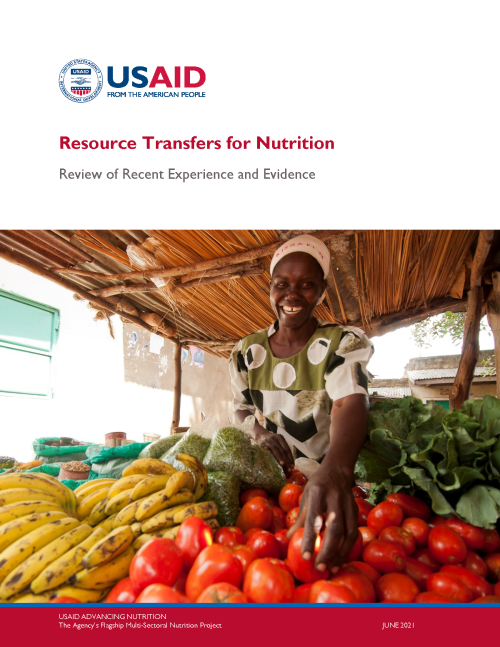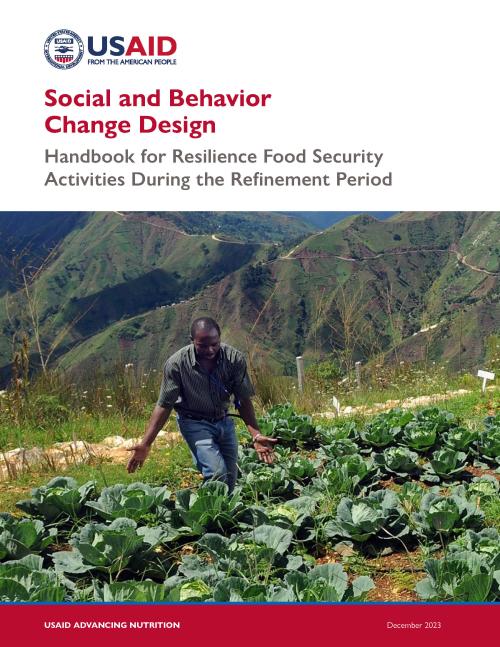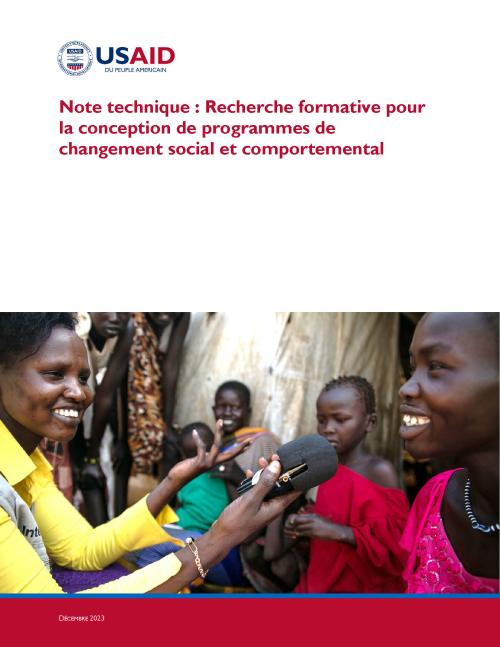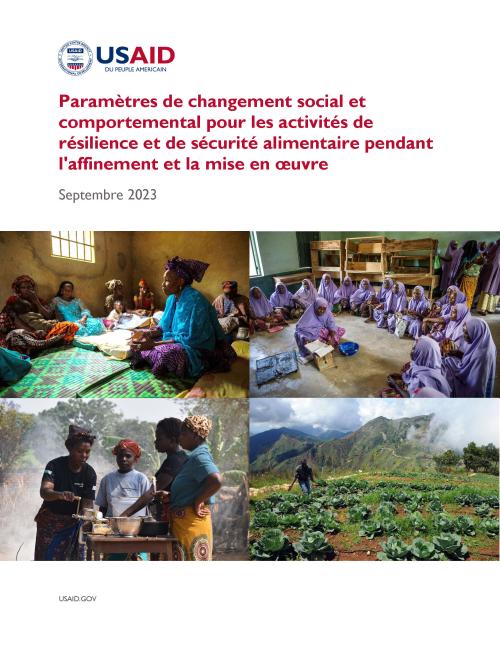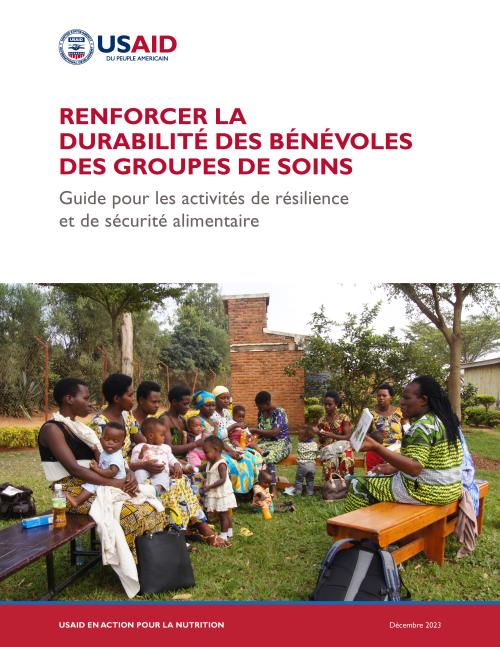
USAID Advancing Nutrition has developed tools and guidance to support USAID’s Resilience Food Security Activity (RFSA) partners and emergency nutrition partners in strengthening their programming. Created with input from and reviews by RFSA partners, these resources cover a range of topics. Use the search or filters below to find resources relevant to your work.
For emergency nutrition resources, visit this resource collection.
We found 18 resource(s)
Optimizing Diets by Using Local Foods for Improved Nutrition for Women and Children: A Guide for Resilience Food Security Activity Partners
This guide aims to support RFSA IPs’ transition from providing resource transfers to using locally available, accessible, and affordable alternatives to sustain nutrition outcomes for women and children under age two. It provides resources, workbooks, templates, and tools with instructions on how to optimize the use of local foods to improve women and children’s nutrition and dietary diversity in a given program area.
Developing Food-Based Recommendations for Complementary Feeding Using Locally Available Foods at the Household Level in Matabeleland North, Zimbabwe
The USAID-funded Amalima Loko program is a five-year (2020–2025) Resilience Food Security Activity (RFSA) operating in five districts of Zimbabwe’s Matabeleland North province. It aims to improve the nutritional status and practices among women of reproductive age and children under five years of age. As part of a package of multi-sectoral efforts to improve nutrition indicators, Amalima Loko envisioned developing local food-based recommendation (FBRs) to utilize locally available foods and support caregivers in addressing sub-optimal feeding practices.
Supporting Integrated Infant and Young Child Nutrition and Early Childhood Development Programming: Ages and Stages Reference Package (Resource Collection)
This package includes four age-specific modules that provide information, at each age/stage, on how children grow and develop, what their feeding and care needs are, and the challenges caregivers face providing optimal care. Each module also provides example activities that programs can do to support targeted nutrition and responsive care and early learning activities at each age/stage.
Social and Behavior Change Competency Assessment: Tool for Resilience Food Security Activities
Competencies are critical to job performance and successful social and behavior change (SBC) nutrition interventions. The Social and Behavior Change Competency Assessment tool guides implementing partners of Resilience and Food Security Activities through a process of identifying existing SBC competencies of core staff and building a plan to strengthen and develop further skills. This tool also walks users though a 12-month skills-development plan and outlines a collaborative, step-by-step process for working with outside facilitators.
Community Health Worker Competency List for Nutrition Social and Behavior Change
This resource identifies 38 competencies that are important for community health workers (CHWs) to demonstrate in order to carry out high-quality social and behavior change (SBC) activities for improved nutrition. Nutrition project managers and Ministries of Health can use this list as a starting point for assessing, developing, and evaluating CHW SBC skills.
Social and Behavior Change Parameters for Resilience and Food Security Activities during Refine and Implement
The purpose of this document is to describe USAID Bureau for Humanitarian Assistance (BHA) expectations for how Resilience and Food Security Activities (RFSA) implementing partners (IPs) could address social and behavior change (SBC) in the refine and implement (R&I) phase of the co-creation process with USAID. This document builds upon the Refine and Implement Overview and FAQ, and recent efforts that BHA has undertaken with IPs during the refinement phase in multiple countries.
Technical Note: Formative Research to Inform Social and Behavior Change Programming Design
This document shares considerations for planning formative research within USAID Bureau for Humanitarian Assistance (BHA)-funded Resilience and Food Security Activities (RFSAs) within the Refinement period. Formative research plans in this period typically aim to generate practical and timely findings across multiple studies to fill information gaps and guide the design of social and behavior change (SBC) programming.
Strengthening the Sustainability of Care Group Volunteers: A Guide for Resilience and Food Security Activities
USAID Advancing Nutrition developed this stepwise guide for Resilience and Food Security Activity implementing partners (IPs) as a reference during project design and implementation (e.g., proposal, Refine and Implement, post-midterm evaluation). The guide aims to assist IPs in thinking critically about whether and how Care Group Volunteers (or similar unpaid peer group volunteers) can be sustained post-project implementation.
Key Considerations for Engaging Men in Maternal, Infant, and Young Child Nutrition Programming: A Technical Report for USAID Resilience Food Security Activity Implementing Partners
This report for USAID Resilience Food Security Activity implementing partners presents 1) common approaches currently used for engaging men in maternal, infant, and young child nutrition programming, 2) findings from the literature and key informant interviews about barriers, and 3) the key considerations for the design, implementation, monitoring, and sustainability of male engagement activities to minimize the risk of engagement while ensuring women’s agency and safety.
USAID Nawiri Framework (Resource Collection)
This framework was implemented in partnership with the Government of Kenya in Marsabit, Isiolo, Samburu, and Turkana Counties, the USAID Nawiri program is a five-year initiative funded by the USAID Bureau for Humanitarian Assistance (BHA) to sustainably reduce persistent acute malnutrition in Kenya’s arid and semi-arid lands (ASALs). USAID Nawiri aims to help resolve the underlying causes of acute malnutrition through this integrated, multi-sectoral resilience-strengthening program that leverages ongoing emergency and development activities.
Modality Decision Tool: Nutrition Addendum
The Modality Decision Tool (MDT) Nutrition Addendum aids implementing partners to apply a nutrition lens to the selection of appropriate food assistance modalities (cash, vouchers, or in-kind) for the nutritionally vulnerable. This addendum is primarily oriented to USAID/BHA's "supplemental nutrition sub-sector" under their emergency activity guidance, but will also be applicable to resilience food security activities that provide a resource transfer to nutritionally vulnerable populations.
Resource Transfers for Nutrition: Review of Recent Experience and Evidence
Bureau for Humanitarian Assistance implementing partners (IP) use U.S. Agency for International Development guidance, existing tools, and technical and programmatic considerations to make activity design decisions and select between cash, voucher, and in-kind modalities to support activities. USAID Advancing Nutrition explored the experience of IPs in selecting between these programming modalities and reviewed a selection of evidence from a variety of sources to derive insights of relevance to development, rapid-onset, and protracted emergency settings.
Participants in a Peer-based Nutrition and Health Program in Zimbabwe Value Dialogue, Peer Support, and Tangible Action: A Qualitative Exploration of Peer Group Experiences
This manuscript describes community-based implementation research, and associated findings, which was conducted to learn how participants of a nutrition and health program define quality peer groups and how they suggest improving peer groups.
Social and Behavior Change Design: Handbook for Resilience Food Security Activities During the Refinement Period
The purpose of this handbook is to orient Resilience Food Security Activities (RFSA) partners with step-by-step instructions for social and behavior change best practices, providing practical tools for each milestone during the refinement period. Seven milestones are used to organize the best practice instructions and tools in (loosely defined) time periods in the refinement period. RFSAs work to strengthen the adaptive, absorptive, and transformative capacities of communities vulnerable to malnutrition and food insecurity through multi-sectoral, integrated activities.
Note technique : Recherche formative pour la conception de programmes de changement social et comportemental
Ce document partage des considérations pour la planification de la recherche formative dans le cadre des activités de résilience et de sécurité alimentaire (RFSA) financées par le Bureau de l'assistance humanitaire (BHA) de l'USAID au cours de la période d'affinement. Les plans de recherche formative de cette période visent généralement à produire des résultats pratiques et opportuns à partir de plusieurs études afin de combler les lacunes en matière d'information et d'orienter la conception de programmes de changement social et comportemental (CSC).
Paramètres de changement social et comportemental pour les activités de résilience et de sécurité alimentaire pendant l'affinement et la mise en oeuvre
L'objectif de ce document est de décrire les attentes du Bureau de l'assistance humanitaire (BHA) de l'USAID sur la façon dont les partenaires de mise en oeuvre des activités de résilience et de sécurité alimentaire (RFSA) doivent aborder le changement social et comportemental (CSC) après l'attribution dans le cadre de l'approche d’affinement et de mise en oeuvre ou de tout autre processus de co-création avec BHA.
RENFORCER LA DURABILITÉ DES BÉNÉVOLES DES GROUPES DE SOINS : Guide pour les activités de résilience et de sécurité alimentaire
L'USAID en action pour la nutrition a élaboré ce guide par étapes pour les partenaires de mise en oeuvre de la RFSA comme référence pendant la conception et la mise en oeuvre du projet (par exemple, proposition, affiner et mettre en oeuvre, évaluation à mi-parcours). Ce guide vise à aider les partenaires de mise en oeuvre à réfléchir de manière critique à la question de savoir si et comment les volontaires des groupes d'entraide (ou des groupes de pairs non rémunérés similaires) peuvent être maintenus après la mise en oeuvre du projet.
Conception du changement social et comportemental : Manuel pour les activités de sécurité alimentaire de résilience pendant la période d'affinage
L'objectif de ce manuel est d'orienter les partenaires des activités de résilience et de sécurité alimentaire (RFSA) avec des instructions étape par étape sur les meilleures pratiques en matière de changement social et comportemental, en fournissant des outils pratiques pour chaque étape pendant la période d'affinage. Sept étapes sont utilisés pour organiser les instructions et les outils relatifs aux meilleures pratiques en périodes (vaguement définies) au cours de la période d'affinage.




